Key Takeaways:
- Almost half of survey respondents experienced monotony to various degrees in their daily work activities.
- One-fifth of the total number of participants reported feeling bored and uninspired at work on a daily basis.
- The lack of challenging projects and creative tasks were cited among the driving factors for monotony and boredom at work, surpassed only by the high number of repetitive tasks.
- More than 45% of workers immediately move on to a new project after completing a task or reaching a milestone — without taking time to rest or reward themselves in any way.
Regardless of how creative or engaging your field of work is, monotony and laborious tasks can still intervene in your everyday work. And, while some thrive in routine and methodical projects, for others, doing the same repetitive task for days and weeks at a time is bound to hinder their creativity and productivity levels. Sometimes, it can even affect their mental health.
For this reason, we wanted to determine exactly how many workers routinely experienced monotony in their daily activities, as well as how they managed it so as to not affect their performance and well-being in a negative way. With this in mind, we conducted a survey and asked the respondents questions aimed at determining their work habits and the ways in which they actively fight monotony, boredom and fatigue in the workplace.
Nearly Half of Respondents Feel Bored at Work, 20% Experience Monotony on a Daily Basis
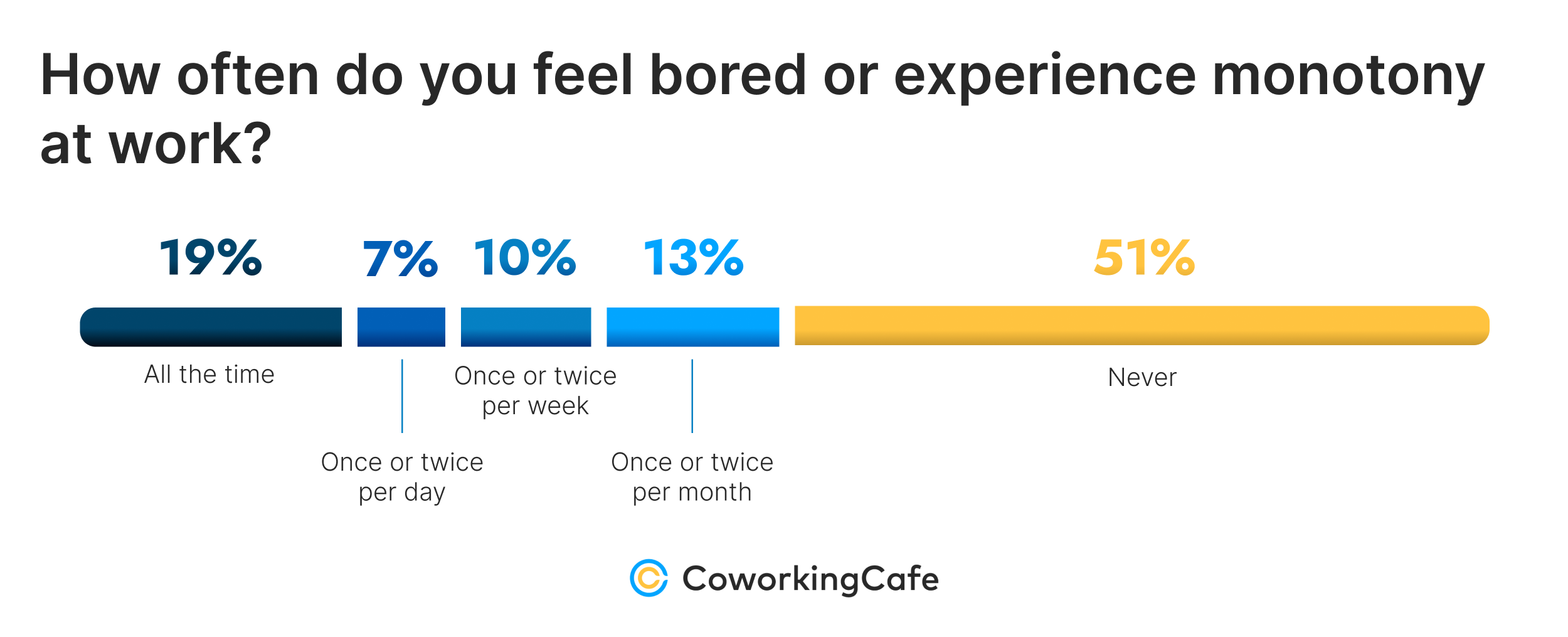 We asked participants in the survey to reveal the frequency with which they face monotony in the workplace and almost on-fifth (19.1%) said they experienced those feelings all the time. Additionally, 12.8% felt boredom or monotony once or twice a month, whereas less than 10% felt the same at least once a week. A smaller share of 6.8% experienced monotony once or twice a day on a regular basis. Perhaps surprisingly, more than half (51.5%) of the survey respondents reported that they never felt bored or experienced monotony at work.
We asked participants in the survey to reveal the frequency with which they face monotony in the workplace and almost on-fifth (19.1%) said they experienced those feelings all the time. Additionally, 12.8% felt boredom or monotony once or twice a month, whereas less than 10% felt the same at least once a week. A smaller share of 6.8% experienced monotony once or twice a day on a regular basis. Perhaps surprisingly, more than half (51.5%) of the survey respondents reported that they never felt bored or experienced monotony at work.
Repetitive Tasks, Lack of Challenging Projects & Limited Creativity Most Common Reasons for Monotony in Workplace
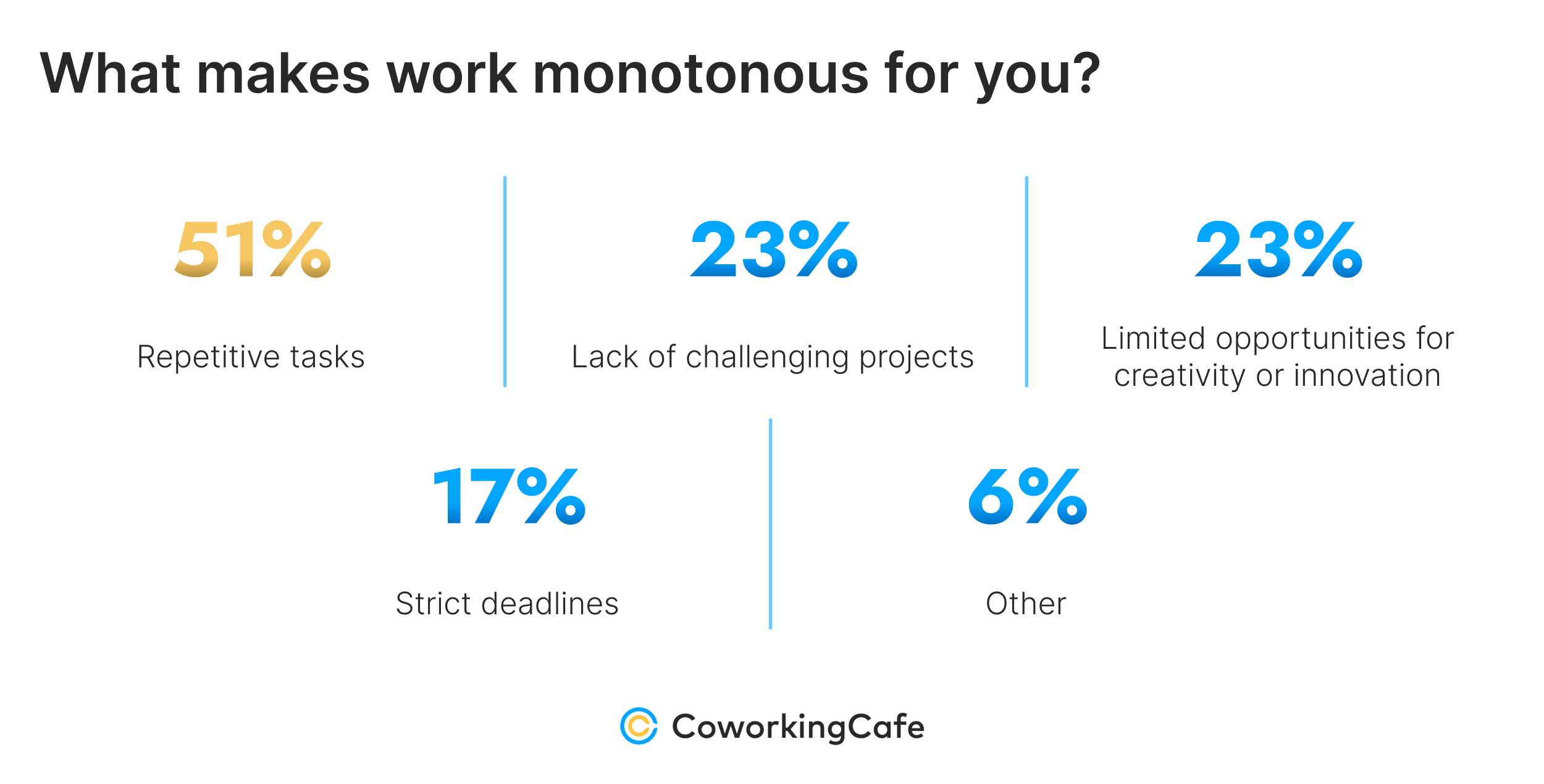 When pinpoiting the exact factors that drove monotony in their workplace, more than half (50.6%) of respondents cited repetitive tasks as a major aspect. Furthermore, nearly one-quarter (23%) thought the lack of challenging projects was the reason why monotony might intervene in their daily work routine, while limited opportunities for creativity and innovation, as well as strict deadlines were also mentioned in smaller shares of 22.6% and 17.4%, respectively.
When pinpoiting the exact factors that drove monotony in their workplace, more than half (50.6%) of respondents cited repetitive tasks as a major aspect. Furthermore, nearly one-quarter (23%) thought the lack of challenging projects was the reason why monotony might intervene in their daily work routine, while limited opportunities for creativity and innovation, as well as strict deadlines were also mentioned in smaller shares of 22.6% and 17.4%, respectively.
Clearly, a series of repetitive tasks and the lack of mental stimulation can negatively affect performance and well-being in the long run. Moreover, many workers are looking for occasional challenges in their workplace to keep them stimulated and engaged.
Many Workers Stay Engaged in Their Work by Either Listening to Music or Frequently Switching Between Tasks
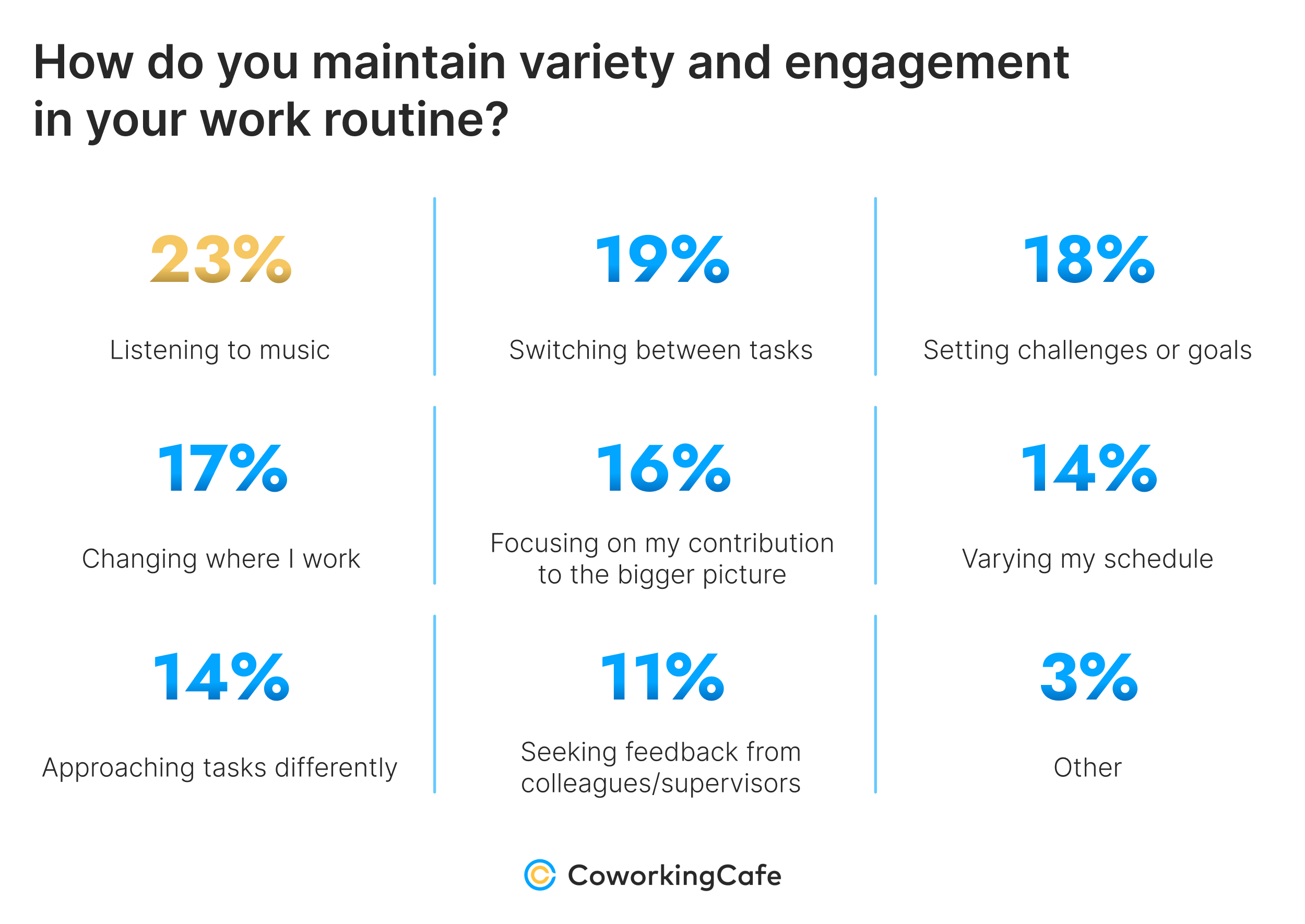 While there’s no “one-size-fits-all” way of combating boredom or tediousness, workers rely on different and personal ways to keep themselves engaged and energized. As such, it appears that a large number of workers (23%) relied on music to break the monotony in their workday. They also used it to keep their minds stimulated, even during repetitive or tedious tasks. Switching between tasks was also a popular way of fighting everyday monotony as 19.1% of respondents chose this answer to the question. Otherwise, setting challenges or goals, even if only self-imposed, was another way in which workers kept monotony at bay, in addition to changing the place where they conduct their work.
While there’s no “one-size-fits-all” way of combating boredom or tediousness, workers rely on different and personal ways to keep themselves engaged and energized. As such, it appears that a large number of workers (23%) relied on music to break the monotony in their workday. They also used it to keep their minds stimulated, even during repetitive or tedious tasks. Switching between tasks was also a popular way of fighting everyday monotony as 19.1% of respondents chose this answer to the question. Otherwise, setting challenges or goals, even if only self-imposed, was another way in which workers kept monotony at bay, in addition to changing the place where they conduct their work.
Especially when it comes to remote work and professionals who spend their days working from home, it’s becoming clearer that an occasional change in pace, work setup, and environment can help drive better engagement and productivity levels. Accordingly, many workers now choose to work in a hybrid manner or at coworking spaces where they can try new ways of conducting their work and potentially engage and socialize with other like-minded people. Apart from that, the ways in which they fight monotony at work vary, as seen in the survey responses. In fact, there wasn’t one clear winner in this category, but rather multiple different ways that fit different workers, preferences and personalities.
More Than 20% of Survey Respondents Use Breaks to Perform Physical Activities, 25% Engage in Social Actions
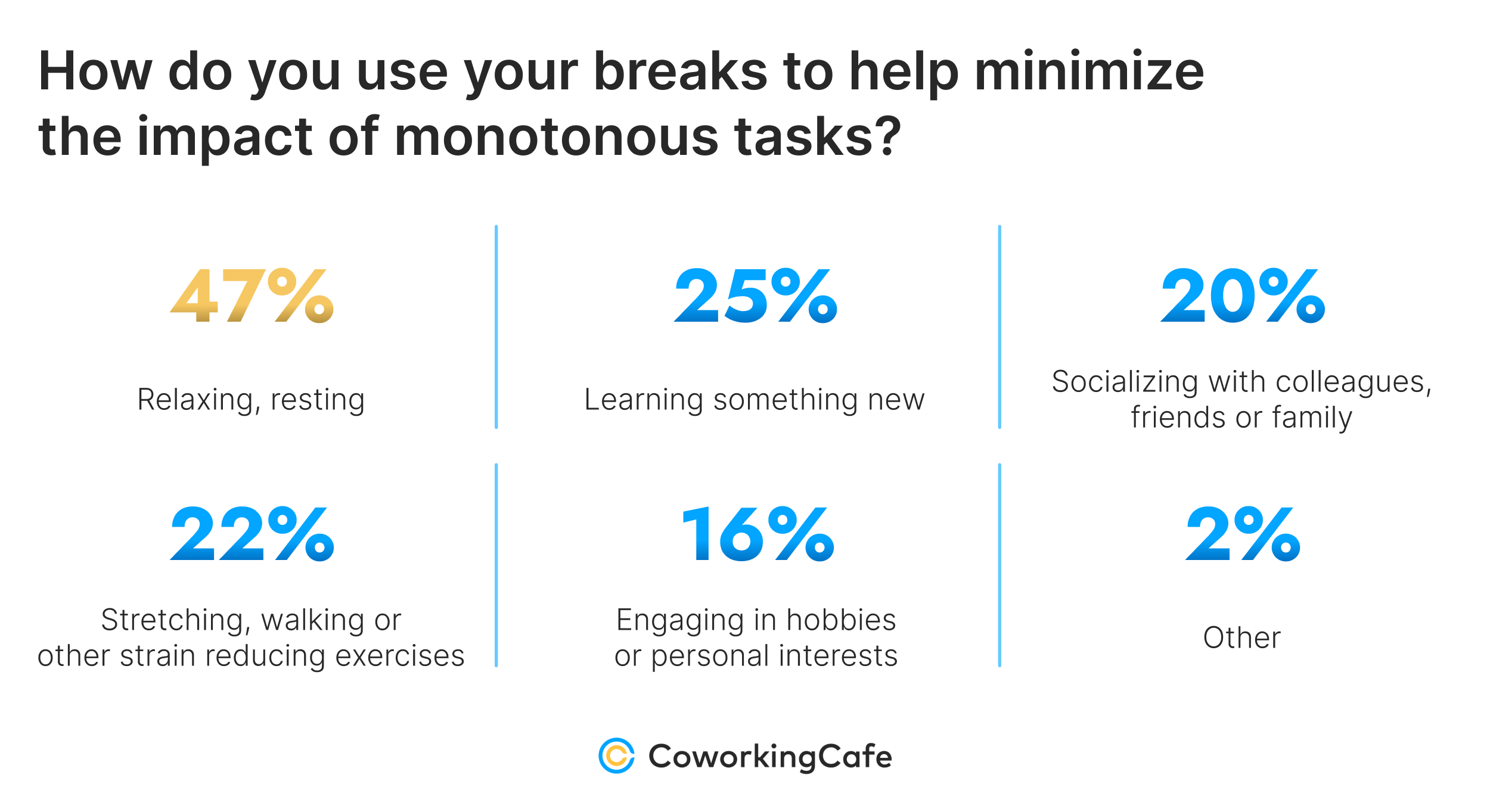 When asked about how they use their breaks to help minimize the effects of repetitive tasks, a vast majority (46.8%) of professionals who participated in the survey said they tried to rest or relax during their break time. At the same time, more than 80% of them also feel the need for more stimulating pursuits, whether physical or mental. As such, one-fifth (22.1%) engaged in physical activities, like walking or other strain-reducing exercises. Otherwise, learning something new apart from their work skillset was an alternative that was preferred by almost one-quarter (24.7%) of workers as it enables them to break monotony while still feeling productive.
When asked about how they use their breaks to help minimize the effects of repetitive tasks, a vast majority (46.8%) of professionals who participated in the survey said they tried to rest or relax during their break time. At the same time, more than 80% of them also feel the need for more stimulating pursuits, whether physical or mental. As such, one-fifth (22.1%) engaged in physical activities, like walking or other strain-reducing exercises. Otherwise, learning something new apart from their work skillset was an alternative that was preferred by almost one-quarter (24.7%) of workers as it enables them to break monotony while still feeling productive.
And, 20% of respondents mentioned socializing with colleagues, friends, or family during their breaks to refuel their social batteries and switch the focus on a more collaborative activity, while 16% also engage in hobbies or personal interests.
This goes to show that balancing work and personal lives helps reduce the feeling of boredom and monotony that many workers experience as work/life balance and mental health influence every aspect of everyday life.
Almost Half of Working Professionals Don’t Take Time to Reward Themselves After Finishing a Task or Reaching a Milestone
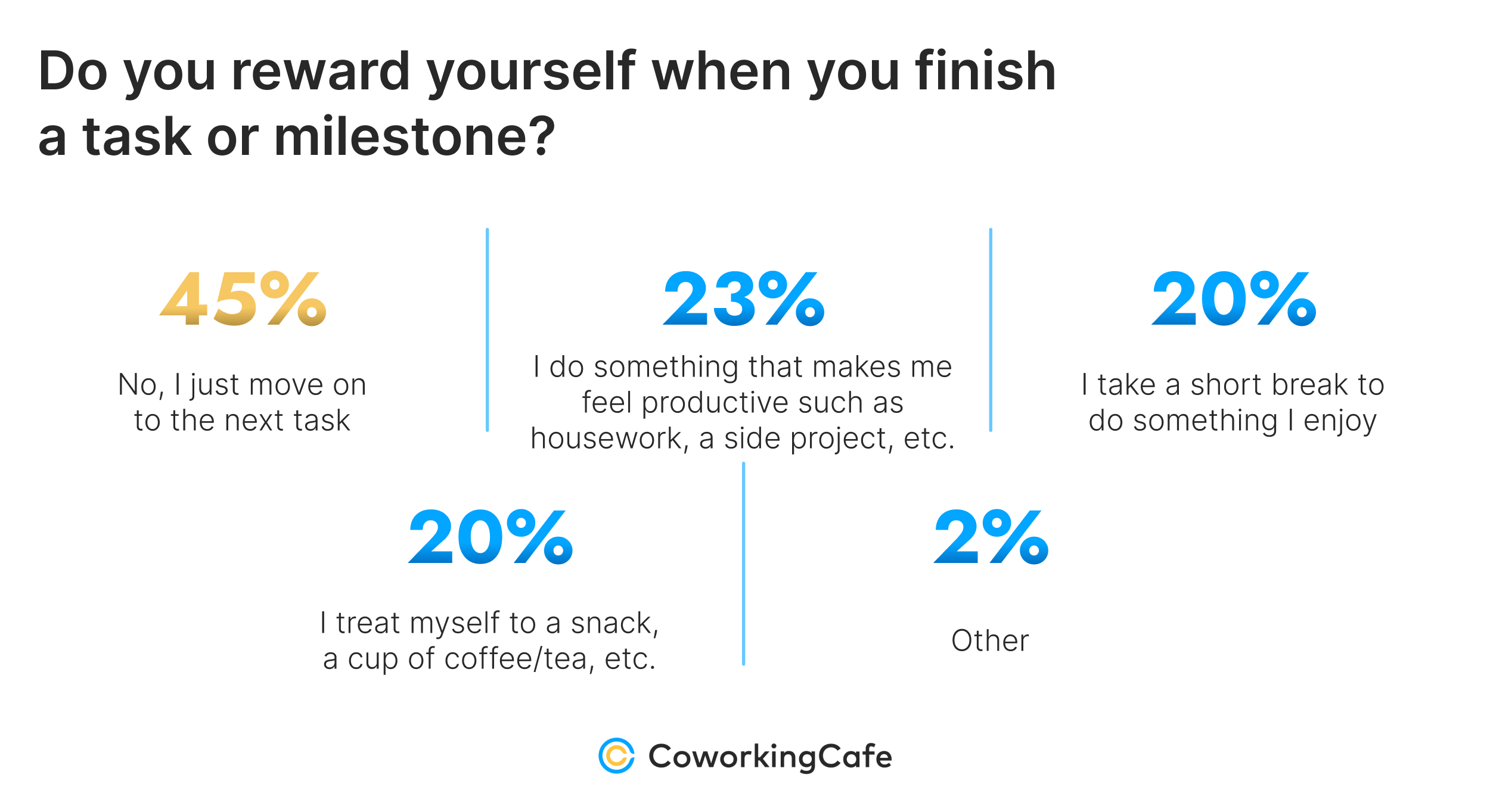 Taking breaks in between work tasks is vital not only from a legal standpoint but also because it enables workers to relax, refocus and recharge their batteries before tackling new projects. However, just 45.1% of survey respondents reported never taking breaks or time to celebrate milestones before moving on to their next task. Another 23% said they balanced their work projects with other tasks that made them feel productive, like doing housework or taking on a side project.
Taking breaks in between work tasks is vital not only from a legal standpoint but also because it enables workers to relax, refocus and recharge their batteries before tackling new projects. However, just 45.1% of survey respondents reported never taking breaks or time to celebrate milestones before moving on to their next task. Another 23% said they balanced their work projects with other tasks that made them feel productive, like doing housework or taking on a side project.
Meanwhile, 20.4% reported treating themselves in a small way to celebrate the completion of a project or a new milestone by simply enjoying a snack or a cup of coffee/tea. Finally, almost one-fifth of survey respondents (19.6%) choose to take a short break in between work assignments to do something they personally enjoy.
Apart from the five questions that we tackled in our survey, we also asked participants to reveal their personal tips or suggestions on how to fight monotony in the workplace. Here are some of the best and most common responses:
- Stepping outside, going for a walk, dancing or engaging in other physical activities
- Listening to music or doing other relaxing activities that don’t place much strain on the mind
- Switching between enjoyable and less enjoyable tasks in order to keep a balance
- Keeping a schedule, actively structuring their workload and having a rewards system in place
Methodology:
- The survey ran between August 20th and October 18th, 2023, on CoworkingCafe, CoworkingMag and Point2Homes.
- The survey was conducted nationwide and gathered a total of 235 complete answers.
- The same topic and the same questions were applied to all participants in the survey.
- The survey had a confidence level of 95% and a margin of error of 6%.
- Multiple answer questions were included in the survey.
Fair Use & Redistribution
We encourage and freely grant you permission to reuse, host or repost the images in this article. When doing so, we only ask that you kindly attribute the authors by linking to CoworkingCafe.com or this page so that your readers can learn more about this project, the research behind it and its methodology.







